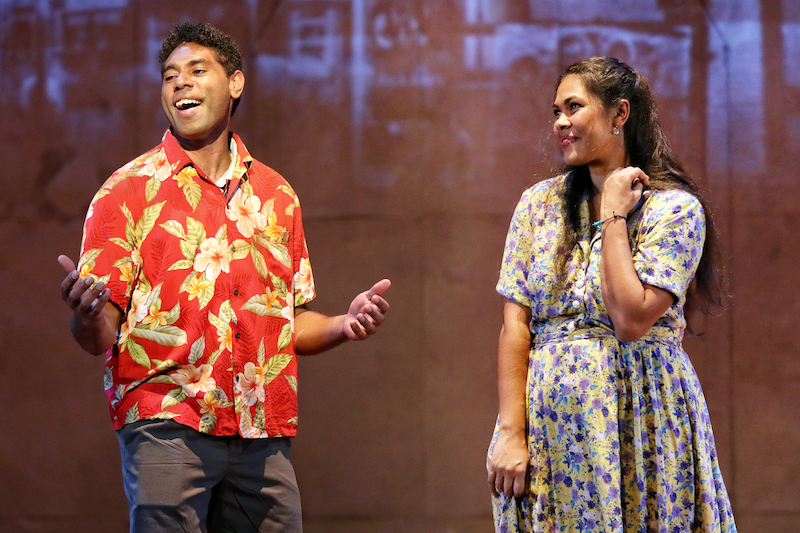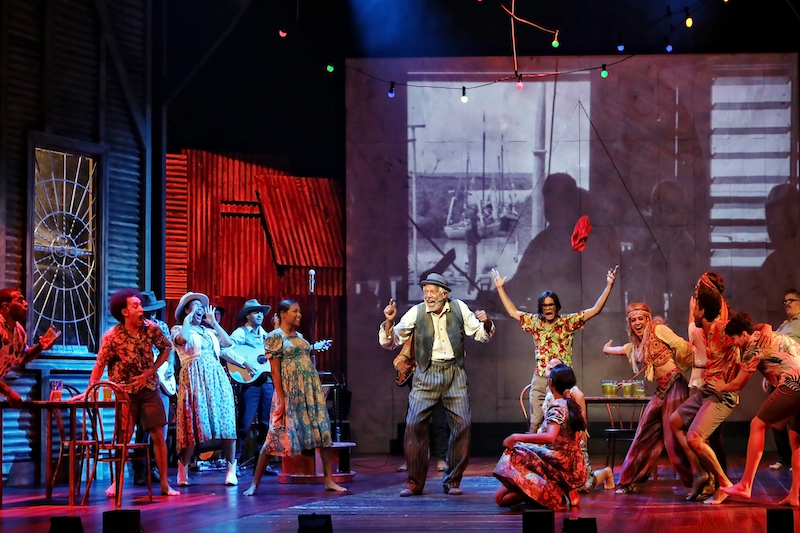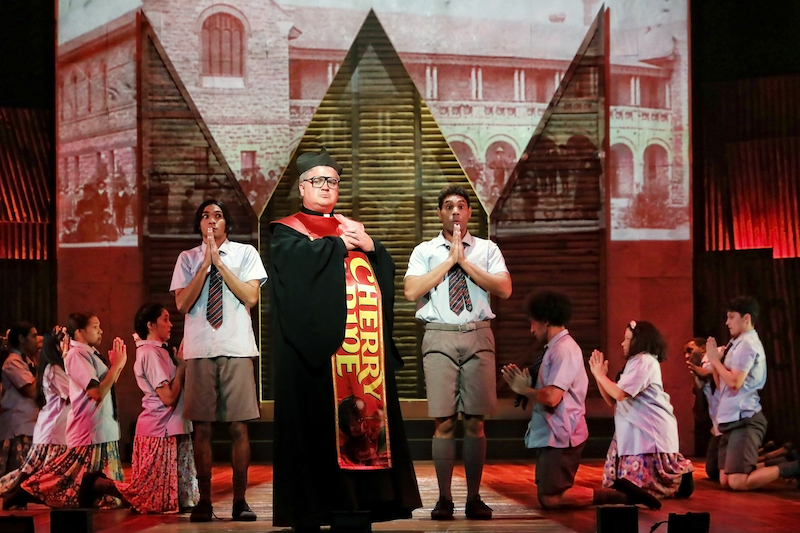Bran Nue Dae will always hold an important place in the history of Australian theatre as the first Aboriginal musical staged – a joyous show, written by Jimmy Chi and the band Kuckles, that subtly infiltrates its exuberant songs with plenty of barbed references to the appalling treatment of Australia’s First Nations people by white society.
 Marcus Corowa and Teresa Moore. Photograph © Prudence Upton
Marcus Corowa and Teresa Moore. Photograph © Prudence Upton
In one of the show’s catchiest numbers, Nothing I Would Rather Be, the performers sing: “There’s nothing I would rather be than to be an Aborigine, and watch you take my precious land from me”, encapsulating the feel-good-while-serious tone adopted by Chi. Dispossession, land rights, the Stolen Generation, and deaths in custody are all invoked in a similar way.
“Is this the end of our people?” sing the cast in the more melancholic song Listen to the News. The gentle resilience and good-natured optimism used throughout the show fills your heart.
Bran Nue Dae had its world premiere at the 1990 Perth Festival. Directed by Andrew Ross, it proved to be a huge success. Touring in 1991, it played at the Riverside Theatre, Parramatta as part of the Festival of Sydney and sold out so quickly that it transferred to Sydney’s Seymour Centre. Now the Opera Conference (an initiative that unites Opera Australia, Opera Queensland, State Opera South Australia and West Australian Opera) is staging a 30th anniversary production, which has just opened in Parramatta as part of Sydney Festival, before touring nationally.
Thirty years on, the skimpiness of the featherweight narrative feels more obvious than I remember – whether that’s just my memory or the production, I’m not sure – but the music is as irresistible as ever.
Bran Nue Dae is semi-autobiographical, loosely based on the experience of Chi who was born in Broome. Set in 1960s Western Australia, teenage schoolboy Willie (Marcus Corowa) – who comes from Lombadina, an Aboriginal community north of Broome – is expelled from the Catholic mission school he is attending in Perth, run by German minister Father Benedictus (Andrew Moran), for stealing Cherry Ripes with some friends.
 Ernie Dingo and the cast of Bran Nue Dae. Photograph © Prudence Upton
Ernie Dingo and the cast of Bran Nue Dae. Photograph © Prudence Upton
Wandering through Perth, desperate to go back home to Rosie (Teresa Moore), the young woman he is sweet on, Willie bumps into Uncle Tadpole (Ernie Dingo). Now living on the streets after years of droving and drinking, Uncle Tadpole decides he also wants to return to Broome, so manoeuvres his way into the path of hippie tourists Slippery (Callan Purcell) and Marijuana Annie (played by understudy Danielle Sibosado on opening night) who agree to drive them in their VW Kombi van.
The plot is wafer thin. Scenes leap from one to the next with hardly any narrative explanation. One minute Uncle Tadpole, Willie, Slippery and Marijuana Annie are in jail, the next they’re not. How did they get out? There are several narrative gaps like this, which the production hasn’t managed to address.
The coincidences at the end of the show are silliness itself if you take them literally. But just go with the flow, and they make for a wonderfully uplifting ending while illustrating the point Chi is making that we are all one and the same, black or white, and should treat each other and each other’s cultures with respect.
The 2009 film, directed by Rachel Perkins, with a screenplay by Perkins, Chi and Reg Cribb, expanded the narrative to add more weight and dramatic tension to the story, as well as a bit more depth to the sketchily drawn characters.
This new stage production opens with a song called Acceptable Coon, sung by an elderly Willie, in which Chi pulls no punches: “They taught me the white ways, and bugger the rest, Cause everything white is right and the best.So learn all the white things they teach you in school, and you’ll all become acceptable coons.”
It was not used in the original production as it was considered too provocative but has been reinstated here. Aside from that, the 30th anniversary production sticks to the original script. It is directed by Andrew Ross and Associate Director Naomi Pigram, a Broome-based singer, songwriter and performer, who is the daughter of Steve Pigram, one of the Kuckles who worked with Chi on the score.
The Broome connection is important; the show comes from Broome and references Broome culture. What’s more, many of the young ensemble come from there – and how lovely it is to see them nailing the lively choreography by Tara Gower, a Bangarra dancer, who has drawn on traditional movement from the Kimberley.
Set and costume designer Mark Thompson sets the show in Broome’s open air cinema, Sun Pictures Gardens, with its corrugated iron walls and folding deck chairs. The large screen is then cleverly used to show projections that help set the scene – from images showing the Kombi van, the streets of Perth, and the outback landscape they are travelling, to a shocking photograph of Aboriginal men in chains, an image mirrored by the ensemble but quickly cast aside as they launch into a dance routine. A few chairs are all that is needed to depict the Kombi van on stage. With lighting by Mark Howett, the staging is very effective.
 Andrew Moran, Taj Jamieson, Marcus Corowa and the cast of Bran Nue Dae. Photograph Prudence Upton
Andrew Moran, Taj Jamieson, Marcus Corowa and the cast of Bran Nue Dae. Photograph Prudence Upton
Thompson’s costumes are also terrific, and suitably tongue-in-cheek at times, from Father Benedictus’s Cherry Ripe chasuble to the silver lamé suit and silver cross tie worn by Pastor Flakkon (Czack Bero) in the religious section featuring Willie’s mother Theresa (Ngaire Pigram).
Ernie Dingo who played Uncle Tadpole in the original production and in the film, returns to the role and anchors the show. Now naturally grey-haired with a raspy voice, he brings just the right comic touch to the wonderfully rascally character, balancing his raunchy, cheeky wit with heartfelt emotion.
Marcus Corowa is a delight as Willie. He has a lovely warm stage presence and a gorgeous, strong, clear voice, while Opera Australia baritone Andrew Moran’s rich, fruity, resonant vocals bounce off the back wall as Father Benedictus. But each performer gives it their all.
The four-piece band (Mia Brine, Ben Ingvarson, Manny Mavromatis and Bart Pigram) which sits at the back of the stage, does a fabulous job, with musical direction by Michael Mavromatis and Patrick Bin Amat.
Despite the flimsiness of the plot and the clunkiness in the narrative structure, the music is irrepressible, vibrant and heart-warming, while the show’s message about the need for reconciliation is (sadly) as timely as ever, as Australia’s First Nations people lobby for more control over their own destiny. If only detractors to the Uluru Statement from the Heart would go to the show we might truly be on our way to a bran nue dae.
Bran Nue Dae plays at Riverside Theatres, Parramatta until February 1; Regal Theatre, Perth for Perth Festival, February 6 – 15; Comedy Theatre, Melbourne, June 12 – July 12; QPAC, Brisbane, July 24 – August 2; Canberra Theatre, August 11 – 16; and Her Majesty’s Theatre, Adelaide, August 19 – 23












Comments
Log in to join the conversation.